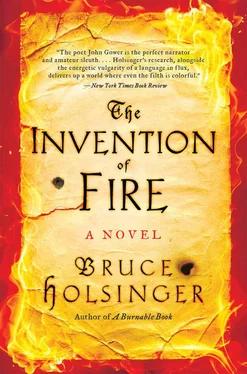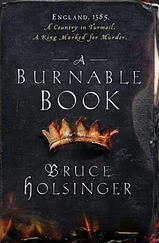Bruce Holsinger - The Invention of Fire
Здесь есть возможность читать онлайн «Bruce Holsinger - The Invention of Fire» — ознакомительный отрывок электронной книги совершенно бесплатно, а после прочтения отрывка купить полную версию. В некоторых случаях можно слушать аудио, скачать через торрент в формате fb2 и присутствует краткое содержание. Год выпуска: 2015, Издательство: HarperCollins, Жанр: Исторический детектив, на английском языке. Описание произведения, (предисловие) а так же отзывы посетителей доступны на портале библиотеки ЛибКат.
- Название:The Invention of Fire
- Автор:
- Издательство:HarperCollins
- Жанр:
- Год:2015
- ISBN:нет данных
- Рейтинг книги:3 / 5. Голосов: 1
-
Избранное:Добавить в избранное
- Отзывы:
-
Ваша оценка:
- 60
- 1
- 2
- 3
- 4
- 5
The Invention of Fire: краткое содержание, описание и аннотация
Предлагаем к чтению аннотацию, описание, краткое содержание или предисловие (зависит от того, что написал сам автор книги «The Invention of Fire»). Если вы не нашли необходимую информацию о книге — напишите в комментариях, мы постараемся отыскать её.
The Invention of Fire — читать онлайн ознакомительный отрывок
Ниже представлен текст книги, разбитый по страницам. Система сохранения места последней прочитанной страницы, позволяет с удобством читать онлайн бесплатно книгу «The Invention of Fire», без необходимости каждый раз заново искать на чём Вы остановились. Поставьте закладку, и сможете в любой момент перейти на страницу, на которой закончили чтение.
Интервал:
Закладка:
“I-I am called Hugh, if you please, sir.”
“Well, Hugh, in those days, before the great pestilence, there was a young maiden, a reeve’s daughter, living on the next manor to ours. She was a remarkable beauty, and in all the shire it was agreed that she would make a splendid match, bringing glory to her father and her family.” And he went on for nearly an hour, spinning a delightful tale of love, nobility, tragedy, and retribution that soon enough had several of the other pilgrims in the company listening in, nodding and laughing at the appropriate places. It was masterfully done, without a single lapse in voice or word, and thrilled her to her bones.
Later, with the story concluded, he nodded toward the front. “Let us ride ahead, Elizabeth.”
“Yes, my lord husband,” she said, and lifted her leg to kick lightly at the mare. From behind her she heard the widow’s soft mutter.
“It is a remarkable likeness, by Jesu’s blood. Truly remarkable.”
She allowed herself a private smile, her shoulders to settle. It had been the correct thing to do, the only thing, to escape the way they did. To fight, to flee, to deceive. Now to survive.
Yet how had he done it? A question nagging at her for days, as they had made their way from a clearing in a Kentish wood to this road so many leagues north of London, all the while pursued by the malevolence that sought to end them both. It had been Margery’s idea for them to travel together and take on the public semblance of marriage. Robert had gone along only reluctantly, yet had quickly become a master imitator. How had he managed to feign a gentleman’s voice and bearing so naturally and with such ease? She asked him.
He smiled almost shyly, still looking at the road. “There. You have stumbled upon my greatest secret, fair wife.”
“As unpublished as your poaching, my lord husband?”
“Indeed. And here it is.” He leaned slightly in her direction. “In my parish, at New Romney, I am renowned as an actor of great note.”
“Truly?”
“The church there performs an interlude of Jesu’s Passion every Whitsuntide. For two days entire the parish and town are given over to the wagons and costume, with the players picked out from households in the surrounding hundreds, high and low alike. When I was young I would seek out every moment of the plays, and rehearse them at home before the hearth or while peeling beets for Father. One day I was overheard by a playwarden, a fellow who fancied my elder sister. He pressed me into the willing service of our players. There was no role I wouldn’t take on. Herod, Herod’s wife, the figures of Mischance and Evil Grace. Pontius Pilate became my favorite. ‘Sire, what say you of Barabbas, a thief and traitor bold?’ Or, ‘There be no man here who will vouch you king, Jesu, but you be a lord or a gentleman.’ You see? Pilate is all in the song and the shoulders.”
“A lord is nothing more than a lofty voice and a heavy purse then, methinks,” she said furtively.
“And a title, and lands to his name, and a firm hand, and a whip,” said Robert.
He did not see her cringe, his words summoning the violence of her dead husband. She regarded him in a different light after this disclosure, admiring anew the deftness of his dissembling, the devilish magic he worked on the company they shared.
That night, in the common room at yet another inn, she sat among the women and the flickering candles as a company of minstrels sang for pennies around the hearth. A long tale of Guy of Warwick, the beautiful Felice, battles with giants, dragons, boars. At one point, as Margery listened with the others, she dozed off for a while, awakening to the sound of claps and laughs as the story reached a moment of absurdity. Yet her eyes fluttered open on a vision of the purest malice, a widow’s cold gaze on her lover’s face.
Chapter 15
Taxes and treachery were the subject of the day when Michael de la Pole, Earl of Suffolk and chancellor of the realm, opened Parliament that year. The lords had assembled that Monday morning in the chamberlain room near the Painted Chamber to hear the earl’s declaration of the causes of their summons to Westminster. The chancellor’s first move was to demand a crushing war levy of four tenths from the towns, and four fifteenths from the counties-such an excessive portion that talk of impeachment began almost immediately. The treasurer and the clerk of the privy seal were also in jeopardy, and the succeeding days and weeks would see a flurry of charges and countercharges, challenges and refusals as the Parliament worked itself into a bitter frenzy against King Richard, who would ride angrily to Eltham with half his household and refuse to hear petitions from the Parliament’s envoys. Everyone could see that the lord chancellor had made the wrong move in those first hours, and that his days in high office were numbered. Despite a political acumen that had kept him at the center of power going on thirty years, the earl never saw the dragons coming, and from every corner of the realm, until he stood within their flames.
All of this I gathered over that first week of Parliament without spending a farthing, as the taverns and shops of the royal capital throbbed with talk of the great events that would shape the realm for years to come. My own business in Westminster on the eighth day of the month was less public, as I needed to see a Shropshire chaplain in town with his lord for Parliament. We met in the hall near Common Pleas, traded the whispers and coin we had come to trade, and I left the palace and walked toward the river, my intention to hire a wherry back to London, where I hoped to find Ralph Strode at the Guildhall. Too much had transpired to keep him uninformed for any longer, though I had yet to decide how much to reveal. Rysyng’s revelations about the mayor bore further investigation, and Piers Goodman’s death had chilled the bones. Strode’s reaction would be loud and violent, I feared, and I had little desire to risk his ire without sounder information.
Strode, it came about, saved me the float. Walking past the narrow line of vicars’ houses fronting the river I saw his distinctive form up ahead, standing on the pathway above the royal docks. He looked to be dawdling, waiting for someone. I was about to hail him when one of the south side doors to the palace flew open and out stepped Brembre himself, his company a dozen strong and including Strode, who fell in at the mayor’s behest and joined arms with him as they went along.
There was always a certain smugness about Nicholas Brembre, a sneering confidence in his own invulnerability. Not pride of blood, as with a higher lord, but the kind of stony facade one sees in those sorts of men who have worked and fought their way up from low places. In Brembre’s case this place was a tenement house in Bread Street Ward, where his father had been a humble cordwainer, shoeing his betters with the finest leathers to be had in London. The son came into the business with a ruthless eye on his future, somehow managing to buy himself into the Worshipful Company of Grocers and establish a successful shop that grew quickly, whether through cunning, corruption, or both. Within a matter of years he had ascended to alderman of his father’s ward, then began his first term as lord mayor of London a few months before old King Edward’s death. His greatest triumph came at Smithfield, when he stood with King Richard against a rebel force five thousand strong, then was knighted for his stolid loyalty.
A false knight, certain lords would always insist on calling him, though he seemed to embrace the accolade rather than spurn the slander. He was Sir Nicholas to his face, Nick the Stick behind his back, and he wielded many rods against his enemies real and imagined. During his most recent election he’d had an opponent killed, knifed in the street, without a thought of penance or guilt.
Читать дальшеИнтервал:
Закладка:
Похожие книги на «The Invention of Fire»
Представляем Вашему вниманию похожие книги на «The Invention of Fire» списком для выбора. Мы отобрали схожую по названию и смыслу литературу в надежде предоставить читателям больше вариантов отыскать новые, интересные, ещё непрочитанные произведения.
Обсуждение, отзывы о книге «The Invention of Fire» и просто собственные мнения читателей. Оставьте ваши комментарии, напишите, что Вы думаете о произведении, его смысле или главных героях. Укажите что конкретно понравилось, а что нет, и почему Вы так считаете.












